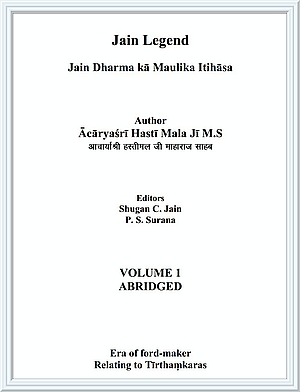The seventh Tīrthaṃkara after Lord Padmaprabha was Śrī Supārśvanātha. In his previous incarnation Lord Supārśvanātha was king Nandisena of Kṣemapurī. Taking initiation into the right path from Ācārya Aridamana, he gained the nāmakarma of Tīrthaṃkara by venerating the 20 causes /reflections. Eventually, at the end of his life, he became a powerful god in the sixth Graiveyaka heaven. Completing his term in the Graiveyaka, on the eighth day of the dark fortnight of Bhādrapada month under constellation Viśākhā, he entered the womb of Pṛthvī, the queen of King Pratiṣṭhasena of Vārāṇasī. That same night the queen saw the 14 dreams indicating the birth of a great person and at the end of her pregnancy period, she happily gave birth to a son on the 12th day of the bright half of the Jyeṣṭha month under the constellation Viśākhā.
On the 12th day at the time of the naming ceremony, recounting that the mother should maintain her rear beautiful during pregnancy, the king named the son Supārśvanātha. At marriageable age, Supārśvanātha was married off to suitable women and thereafter, he was crowned king. The Lord enjoyed the king's position for some 14 lakh pūrvas or more directing subjects on the path of righteousness and justice.
After ruling for a long time, considering useless the sensual karmas, he wished to accept the spiritual path. Upon request by the lokāntika gods, he gave charities for one year, and on the 13th day of the bright half of Jyeṣṭha, took initiation along with 1000 other kings. Having fasted he pulled out five fistfuls of hair in the garden and getting rid of all faults forever, became a monk. Next day his first fast-breaking happened at the house of Mahendra, the king of Pāṭalikhaṇḍa.
He wandered about for 9 months observing various austerities as a mendicant. Then, reaching Sahasrāmravana, entered into deep meditation. Destroying the four obscuring karmas such as knowledge deluding, he attained pure knowledge and pure intuition on the sixth day of the bright fortnight of Fālguna under Viśākhā constellation. On becoming a kevalī he gave religious discourse at a grand assembly attended by gods and men, explaining the difference between inanimate and animate, said all things in the apparent world, including even the body, are not ours. To consider the outer / apparent things as one's own is the root cause of sorrow. Hearing this sermon of his, thousands of men and women became followers of the path of self-restraint. The Lord founded the four-fold creed (tīrtha) and got the status of Tīrthaṃkara.
His congregation had 95 gaṇas and Gaṇadharas, the chief among them being Vidarbha. There were also 1100 omniscient, 9150 telepaths, 9000 clairvoyants, 2350 14 - pūrvadhārīs, 15300 vaikriyalabdhidhārīs, 8400 Vādīs, 300000 monks, 430000 female-monks, 257000 votaries and 493000 female-votaries.
Out of a total life-span of 20 lakh pūrvas, after spending 5 lakh pūrvas as a youth, a little more than 14 lakh pūrvas as king, 20 pūrvāṃgas less than 1 lakh pūrvas in the spiritual path of self-restraint, when he sensed his life coming to an end, after a month's fast, he attained enlightenment and nirvāṇa, destroying the four obscuring karmas on the 7th day of the dark half of Fālgun and, with him 500 monks, too, became liberated.
 Acharya Hasti Mala
Acharya Hasti Mala
